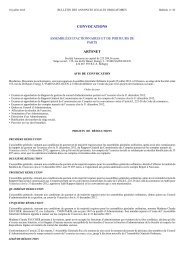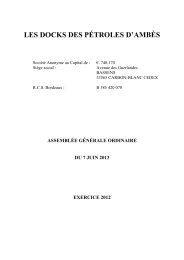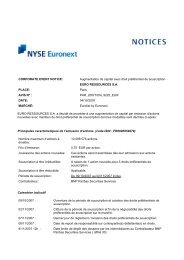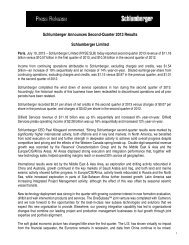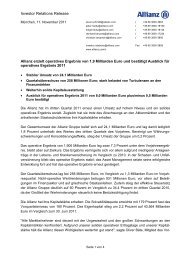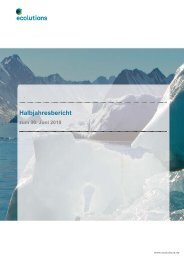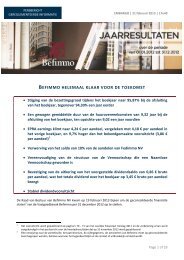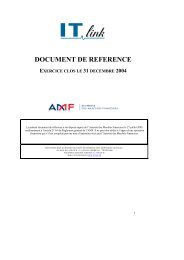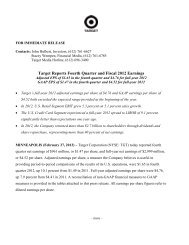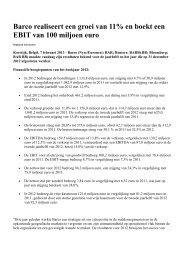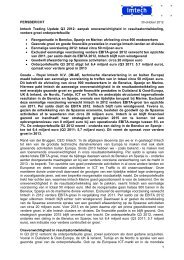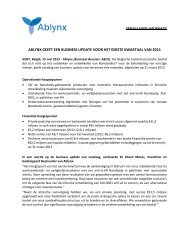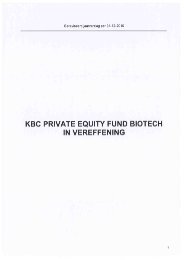FORM 10-Q
FORM 10-Q
FORM 10-Q
Create successful ePaper yourself
Turn your PDF publications into a flip-book with our unique Google optimized e-Paper software.
expenses associated with its asbestos litigations. Aqua-Chem demanded that our Company reimburse it for approximately $ <strong>10</strong> million for out-of-pocket<br />
litigation-related expenses. Aqua-Chem also demanded that the Company acknowledge a continuing obligation to Aqua-Chem for any future liabilities and<br />
expenses that are excluded from coverage under the applicable insurance or for which there is no insurance. Our Company disputes Aqua-Chem's claims, and<br />
we believe we have no obligation to Aqua-Chem for any of its past, present or future liabilities, costs or expenses. Furthermore, we believe we have substantial<br />
legal and factual defenses to Aqua-Chem's claims. The parties entered into litigation in Georgia to resolve this dispute, which was stayed by agreement of the<br />
parties pending the outcome of litigation filed in Wisconsin by certain insurers of Aqua-Chem. In that case, five plaintiff insurance companies filed a<br />
declaratory judgment action against Aqua-Chem, the Company and 16 defendant insurance companies seeking a determination of the parties' rights and<br />
liabilities under policies issued by the insurers and reimbursement for amounts paid by plaintiffs in excess of their obligations. During the course of the<br />
Wisconsin insurance coverage litigation, Aqua-Chem and the Company reached settlements with several of the insurers, including plaintiffs, who have or will<br />
pay funds into an escrow account for payment of costs arising from the asbestos claims against Aqua-Chem. On July 24, 2007, the Wisconsin trial court<br />
entered a final declaratory judgment regarding the rights and obligations of the parties under the insurance policies issued by the remaining defendant insurers,<br />
which judgment was not appealed. The judgment directs, among other things, that each insurer whose policy is triggered is jointly and severally liable for <strong>10</strong>0<br />
percent of Aqua-Chem's losses up to policy limits. The court's judgment concluded the Wisconsin insurance coverage litigation. The Georgia litigation remains<br />
subject to the stay agreement. The Company and Aqua-Chem continued to negotiate with various insurers that were defendants in the Wisconsin insurance<br />
coverage litigation over those insurers' obligations to defend and indemnify Aqua-Chem for the asbestos-related claims. The Company anticipated that a final<br />
settlement with three of those insurers (the "Chartis insurers") would be finalized in May 2011, but such insurers repudiated their settlement commitments<br />
and, as a result, Aqua-Chem and the Company filed suit against them in Wisconsin state court to enforce the coverage-in-place settlement or, in the alternative,<br />
to obtain a declaratory judgment validating Aqua-Chem and the Company's interpretation of the court's judgment in the Wisconsin insurance coverage<br />
litigation. In February 2012, the parties filed and argued a number of cross-motions for summary judgment related to the issues of the enforceability of the<br />
settlement agreement and the exhaustion of policies underlying those of the Chartis insurers. The court granted defendants' motions for summary judgment that<br />
the 2011 settlement agreement and 20<strong>10</strong> term sheet were not binding contracts, but denied their similar motions related to the plaintiffs' claims for promissory<br />
and/or equitable estoppel. On or about May 15, 2012, the parties entered into a mutually agreeable settlement/stipulation resolving two major issues:<br />
exhaustion of underlying coverage and control of defense. On or about January <strong>10</strong>, 2013, the parties reached a settlement of the estoppel claims and all of the<br />
remaining coverage issues, with the exception of one disputed issue relating to the scope of the Chartis insurers' defense obligations in two policy years. The<br />
trial court granted summary judgment in favor of the Company and Aqua-Chem on that one open issue and entered a final appealable judgment to that effect<br />
following the parties' settlement. On January 23, 2013, the Chartis insurers filed a notice of appeal of the trial court's summary judgment ruling. Whatever the<br />
outcome of that appeal, these three insurance companies will remain subject to the court's judgment in the Wisconsin insurance coverage litigation.<br />
The Company is unable to estimate at this time the amount or range of reasonably possible loss it may ultimately incur as a result of asbestos-related claims<br />
against Aqua-Chem. The Company believes that assuming (a) the defense and indemnity costs for the asbestos-related claims against Aqua-Chem in the future<br />
are in the same range as during the past five years, and (b) the various insurers that cover the asbestos-related claims against Aqua-Chem remain solvent,<br />
regardless of the outcome of the coverage-in-place settlement litigation but taking into account the issues resolved to date, insurance coverage for substantially<br />
all defense and indemnity costs would be available for the next <strong>10</strong> to 15 years.<br />
Tax Audits<br />
The Company is involved in various tax matters, with respect to some of which the outcome is uncertain. We establish reserves to remove some or all of the tax<br />
benefit of any of our tax positions at the time we determine that it becomes uncertain based upon one of the following conditions: (1) the tax position is not<br />
"more likely than not" to be sustained, (2) the tax position is "more likely than not" to be sustained, but for a lesser amount, or (3) the tax position is "more<br />
likely than not" to be sustained, but not in the financial period in which the tax position was originally taken. For purposes of evaluating whether or not a tax<br />
position is uncertain, (1) we presume the tax position will be examined by the relevant taxing authority that has full knowledge of all relevant information;<br />
(2) the technical merits of a tax position are derived from authorities such as legislation and statutes, legislative intent, regulations, rulings and case law and<br />
their applicability to the facts and circumstances of the tax position; and (3) each tax position is evaluated without consideration of the possibility of offset or<br />
aggregation with other tax positions taken. A number of years may elapse before a particular uncertain tax position is audited and finally resolved or when a tax<br />
assessment is raised. The number of years subject to tax assessments varies depending on the tax jurisdiction. The tax benefit that has been previously<br />
reserved because of a failure to meet the "more likely than not" recognition threshold would be recognized in our income tax expense in the first interim period<br />
when the uncertainty disappears under any one of the following conditions: (1) the tax position is "more likely than not" to be sustained, (2) the tax position,<br />
amount, and/or timing is ultimately settled through negotiation or litigation, or (3) the statute of limitations for the tax position has expired. Refer to Note 13.<br />
16



